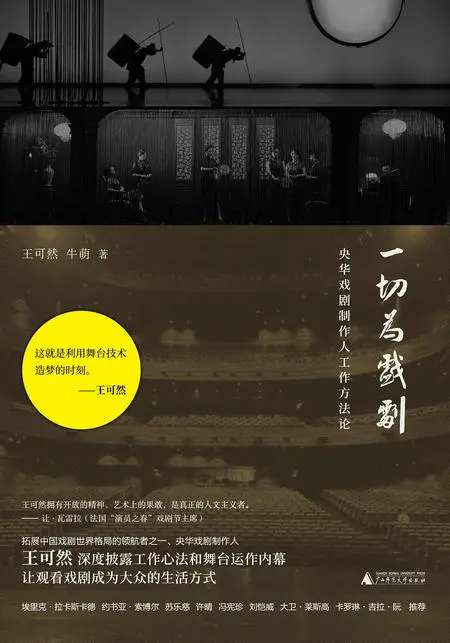Newly published book Yiqie Weixiju (Everything Is for Theater).[Photo/China Daily]
It's hard to define what a theater producer does exactly, even for those working in the field.
"Many think theater producers are people who 'look for money and talent'," said Niu Meng, one of the writers of the book Yiqie Weixiju (Everything Is for Theater), at its launch ceremony at the Poly Theater in Beijing recently.
"For many, sometimes theater producers deal with financial or commercial affairs, or work like a steward; sometimes, they are salespeople, publicists, ticket-service providers, agents for actors and actresses, servants. At other times, they are in charge of logistics, and responsible for investment, integrating resources, running errands and 'putting out fire'. In a word, they do everything trivial, but many things that seem unrelated to the art itself," she said, adding that "most domestic theater producers would encounter misunderstanding and underestimation".
This became one of the major reasons for Wang Keran, founder, chief producer, and art director of Magnificent Culture, one of the leading theater production companies in China, and Niu, to co-create the book. Founded in 2008, Magnificent Culture has successfully introduced and produced plays and musicals, including A Dream Like a Dream, The Village, Ghetto, Winter Journey, and Ponzi, in the Chinese mainland.
"Theater is not a very popular art well known by the masses in China," Wang says.
"The misunderstandings about theater are harmful to its development. I thought that maybe there should be a book or a course that can tell people what theater producers really do," he says.
Based on the interviews with Wang over the past several years, Niu has tried to answer the question "what is a theater producer" in the 316-page book. In concise and fluent language, the book records Wang's understanding of theater and his work as a producer in the past 13 years: How to choose a script? How to choose actors, actresses and directors? How to communicate with them? How to deal with all the businesses during the production of a theater, big or small? How to market a theater? How to brand a theater company?
"The most important quality for a theater producer is to be able to deal with the highly uncertain working environment," Niu says.
"A theater producer spends every day in uncertainty, and his or her work is to transform all the variables into definite facts, and to produce an artwork from scratch, which is universally inspirational," she says.
"People from other professions can read the book, too, because we are all confronted with this changeable time," she says.
Hailed as one of the most successful theater producers, commercially and artistically, Wang was often asked to define the essence of a producer on different occasions, including at the ceremony. His answer was "the authentic principle". Shaking off all the tags on theater and theater producers, Wang applauds authentic things that "grow from life and people's heart".
 简体中文
简体中文

